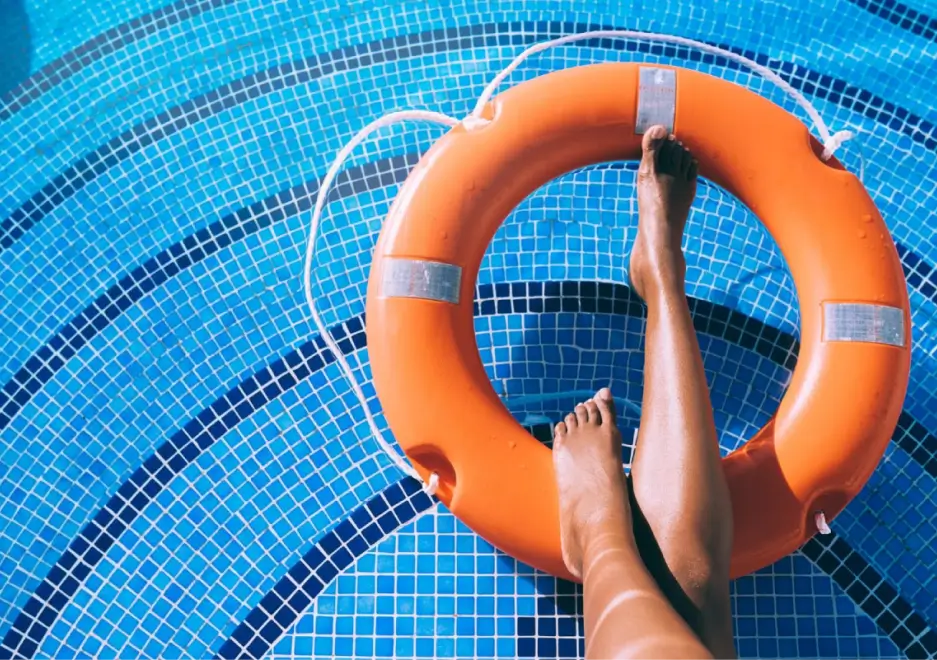Swimming offers great fun and relaxation, but it’s important to prioritize safety to prevent accidents. A backyard pool can be an enjoyable place for everyone, but it also carries risks if the proper precautions aren’t taken. This article covers important pool safety tips, including necessary equipment, the importance of supervision, establishing rules, the benefits of swimming lessons, and emergency preparedness. By following these guidelines, the pool area can become a safer environment for a family!
Important Pool Safety Equipment
Having the right equipment is crucial to keeping your pool safe. Below are some of the must-have items that can help prevent accidents and save lives.
Pool Life-Saving Devices
Make sure you have important life-saving tools. A ring buoy is a must-have! These devices can be thrown to someone in trouble in the water and pull them to safety. Choose the right size for your pool. Another useful tool is a life hook, also called a shepherd’s crook, which helps pull someone to the side of the pool. Some life hooks have extendable poles for easy storage. Also, keep life jackets in different sizes for everyone, from infants to adults. They provide extra safety for people who can’t swim well.

Pool Alarms And Covers
Pool alarms alert you when someone enters the pool area, using sensors to detect movement in the water or at the gate. A strong pool cover is also crucial; it prevents accidental falls and supports significant weight. Automatic covers offer convenience, though they may not be as strong as spring-loaded ones. Combining alarms and covers provides extra protection, so check and maintain this equipment to keep it ready for use.
Pool Supervision And Rules
Supervision is key to pool safety. Make sure there is always an adult to watch over swimmers. This person should be at least 16 years old and able to recognize and help someone in trouble. They should have a phone handy to call 911 and a floating object for rescue. Drowning can happen, even with many adults nearby.

Establishing And Enforcing Pool Rules
Establish clear pool rules and make sure they are enforced. Begin with the basics, such as no running around the pool, no diving in shallow water, and no swimming alone. Teach kids to always enter the water feet first and to use slides in a safe way. Prohibit food, drinks, and gum in the pool to reduce the risk of choking. Moreover, implement a “no glass” rule near the pool to prevent injuries from broken glass. After meals, have children rest for a few minutes before getting back into the water.
Swimming Skills and Education
Swimming lessons are important. Get your kids into lessons as soon as possible. The American Academy of Pediatrics recommends starting swim lessons at age 1. Studies show that swim lessons can reduce the risk of drowning in children aged 1 to 4 by 88%. By age 4, most kids can learn basic water survival skills like floating and treading water. Look for classes that teach water competency skills, not just swimming strokes. Kids should learn to get back to the surface, swim 25 yards, and exit the water.

Water Safety Courses For Families
Water safety courses are important for the whole family. These courses teach you to recognize drowning risks and how to respond in an emergency. You’ll learn about pool safety equipment, supervision rules, and how to create layers of protection. Make sure your kids know never to swim alone and always to ask permission before getting in the water. Practice water skills in realistic conditions, like swimming in clothes. Older children should learn how to help others and how to get help when needed.
CPR And First Aid Training
CPR and first aid training are good for everyone in your family. These skills can make the difference in saving a life. CPR can double or triple someone’s chances of survival. First aid training teaches you how to handle common emergencies like choking, burns, and severe bleeding. You’ll learn when to call 911 and how to care for someone until help arrives. Many organizations offer quick online courses that teach life saving skills in about 30 minutes.

Pool Emergency Preparedness
Having an emergency action plan (EAP) for your pool is important. This plan should outline who does what and when during an emergency. Keep it simple and easy to follow. Your EAP should cover different situations, like minor injuries, life-threatening emergencies, bad weather, and exposure to bodily fluids. Practice the EAP with your family and pool users to make sure everyone knows their role.
Keeping Emergency Contact Information Accessible
Make sure emergency contact information is easily accessible. A phone should be easy to reach and clearly marked. Post emergency numbers, including 911, near the phone, and make sure everyone knows how to use it. This phone can be a lifeline in various emergencies, not just drowning incidents.

Regular Pool Safety Drills
Conduct regular safety drills to keep everyone prepared. Simulate scenarios like rescuing a distressed swimmer or performing CPR. For lifeguards, use unannounced drills to improve detection times and prepare for real emergencies. Also, test pool visibility by dropping objects to identify areas where it’s hard to see the bottom due to glare or murky water.

Enjoy Your Pool In A Safe Way!
Pool safety requires careful attention and a strong commitment. Having the right equipment, setting clear rules, and supervising can reduce risks. Teaching swimming skills and water safety adds extra protection. Being prepared with an emergency plan, easy-to-find contacts, and regular safety drills ensures quick responses. With these steps in place, you can enjoy your pool knowing your loved ones are protected.
Frequently Asked Questions
What are good safety guidelines for both home and community swimming pools?
There are several important safety guidelines to follow. Always walk, never run, around the pool to prevent slips and falls. Follow all posted pool rules. Avoid diving in shallow areas of the pool. Stay away from rough play like pushing or roughhousing. Keep clear of pool drains and covers. Never swim alone; always have someone else with you. Protect yourself from the sun by wearing sunscreen and the right clothing. Use pool safety equipment correctly.
Can you list some important water safety rules to observe around pools?
Here are six key water safety rules. Always have an adult supervise children when they are swimming. Enter the water feet first, especially if you don’t know how deep it is. Never run near the pool to avoid accidents. Keep glass containers away from the pool area to prevent accidents. Avoid pushing or engaging in rough play. Use the bathroom before swimming to keep the pool clean and safe.
What are some general safety rules to follow in the pool?
To stay safe in the pool, never run around the pool area to avoid accidents. Avoid pushing or dunking others, as it is unsafe. Only dive in areas where the water is at least 9 feet deep and clearly marked as safe for diving. Leave the pool during bad weather, especially if there is lightning.
How can families swim safely together?
To keep everyone safe when swimming with family, always have a responsible adult watch over the children at all times near the water. Learning CPR is important in case of emergencies. Make sure each family member knows basic water survival skills. Don’t rely on inflatable swimming aids like floaties, as they are not true safety devices. Always enforce simple water safety rules.
Poseidon Pools is a trusted Texas-based company specializing in creating custom pools and spas that turn backyards into beautiful, relaxing retreats. With a focus on quality craftsmanship and customer satisfaction, we design, build, and maintain pools that reflect your style and needs. Our experienced team uses top-quality materials and the latest technology to deliver stunning results. Whether you’re looking for a new pool or need maintenance for your existing one, Poseidon Pools is committed to making your outdoor dreams a reality. For more information, please visit Poseidon Pools.
Contact Us Today!
Get In Touch With Poseidon Pools & Spas
Reach out to our company by filling out the form, or call us at
Or get a custom pool quote in 90 seconds by clicking here.


